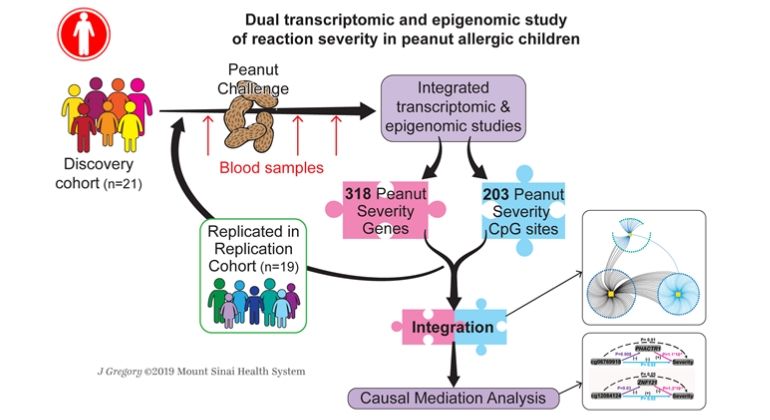Mount Sinai Researchers Survey Shows That Nearly Half of Children with Food Allergies Experience Bullying
The study, titled, “Child and Parental Reports of Bullying in a Consecutive Sample of Children with Food Allergy,” appears in the online issue of Pediatrics.
Nearly half of children diagnosed with food allergies who participated in a recent study are bullied, according to researchers at the Icahn School of Medicine at Mount Sinai. One third of those bullied specifically due to their food allergy. Almost eight percent of children in the U.S. are allergic to foods such as peanuts, tree-nuts, milk, eggs, and shellfish.
Nearly half of parents surveyed (47.9 percent) were not aware of the bullying—although both the bullied children and their parents reported experiencing higher stress levels and lower quality of life.
The study, titled, "Child and Parental Reports of Bullying in a Consecutive Sample of Children with Food Allergy," appears in the online issue of Pediatrics on December 24. The study was led by Eyal Shemesh, MD, Associate Professor of Pediatrics and Psychiatry at the Icahn School of Medicine at Mount Sinai. Dr. Shemesh and his team surveyed 251 pairs of parents and children. The patient and parent pairs were consecutively recruited during allergy clinic visits to independently answer questionnaires. Bullying due to food allergy or for any cause, quality of life, and distress in both the child and parent were evaluated using validated questionnaires.
"Parents and pediatricians should routinely ask children with food allergy about bullying," said Dr. Shemesh. "Finding out about the child's experience might allow targeted interventions, and would be expected to reduce additional stress and improve quality of life for these children trying to manage their food allergies." Dr. Shemesh is Director of EMPOWER (Enhancing, Managing, and Promoting Well-being and Resiliency), a program within Mount Sinai's Jaffe Food Allergy Institute. Dr. Shemesh is also Chief of the Division of Behavioral and Developmental Health in the Department of Pediatrics at The Mount Sinai Medical Center.
"When parents are aware of the bullying, the child's quality of life is better," said the senior author, Scott H. Sicherer, MD, Professor of Pediatrics, Chief, Division of Pediatric Allergy, Co-Director, EMPOWER program. "Our results should raise awareness for parents, school personnel, and physicians to proactively identify and address bullying in this population."
The work for the study was supported by the EMPOWER program, a program funded by a generous donation from the Jaffe Family Foundation, that is devoted to understanding and enhancing the quality of life of persons with food allergy.
About The Mount Sinai Medical Center
The Mount Sinai Medical Center encompasses both The Mount Sinai Hospital and Icahn School of Medicine at Mount Sinai. Established in 1968, the Icahn School of Medicine is one of the leading medical schools in the United States, and is noted for innovation in education, biomedical research, clinical care delivery, and local and global community service. It has more than 3,400 faculty in 32 departments and 14 research institutes, and ranks among the top 20 medical schools both in National Institutes of Health (NIH) funding and by U.S. News & World Report.
The Mount Sinai Hospital, founded in 1852, is a 1,171-bed tertiary- and quaternary-care teaching facility and one of the nation's oldest, largest and most-respected voluntary hospitals. In 2012, U.S. News & World Report ranked The Mount Sinai Hospital 14th on its elite Honor Roll of the nation's top hospitals based on reputation, safety, and other patient-care factors. Mount Sinai is one of 12 integrated academic medical centers whose medical school ranks among the top 20 in NIH funding and by U.S. News & World Report and whose hospital is on the U.S. News & World Report Honor Roll. Nearly 60,000 people were treated at Mount Sinai as inpatients last year, and approximately 560,000 outpatient visits took place.
For more information, visit http://www.mountsinai.org.
Find Mount Sinai on:
Facebook: http://www.facebook.com/mountsinainyc
Twitter @mountsinainyc @multiscalebio
YouTube: http://www.youtube.com/mountsinainy
About the Mount Sinai Health System
Mount Sinai Health System is one of the largest academic medical systems in the New York metro area, with 48,000 employees working across seven hospitals, more than 400 outpatient practices, more than 600 research and clinical labs, a school of nursing, and a leading school of medicine and graduate education. Mount Sinai advances health for all people, everywhere, by taking on the most complex health care challenges of our time—discovering and applying new scientific learning and knowledge; developing safer, more effective treatments; educating the next generation of medical leaders and innovators; and supporting local communities by delivering high-quality care to all who need it.
Through the integration of its hospitals, labs, and schools, Mount Sinai offers comprehensive health care solutions from birth through geriatrics, leveraging innovative approaches such as artificial intelligence and informatics while keeping patients’ medical and emotional needs at the center of all treatment. The Health System includes approximately 9,000 primary and specialty care physicians and 10 free-standing joint-venture centers throughout the five boroughs of New York City, Westchester, Long Island, and Florida. Hospitals within the System are consistently ranked by Newsweek’s® “The World’s Best Smart Hospitals, Best in State Hospitals, World Best Hospitals and Best Specialty Hospitals” and by U.S. News & World Report's® “Best Hospitals” and “Best Children’s Hospitals.” The Mount Sinai Hospital is on the U.S. News & World Report® “Best Hospitals” Honor Roll for 2025-2026.
For more information, visit https://www.mountsinai.org or find Mount Sinai on Facebook, Instagram, LinkedIn, X, and YouTube.

Multi-omics Approach Offers New Insights into Peanut Allergy Severity
Dec 12, 2019 View All Press Releases